Two arrivals in Sydney on a flight from Africa have tested positive for Covid, prompting urgent analysis of their samples amid fears they could be carrying the super-infectious new Omicron strain of the virus, as Australia closes down travel from southern Africa and re-introduces strict quarantine regulations.
Australia has closed its border to nine nations in southern Africa, which is the source of Omicron, and anyone who has already arrived from those countries must immediately undergo 14 days quarantine.
New South Wales, Victoria and ACT have gone further and announced that arrivals from any overseas country must now self-isolate for 72 hours and get tested on arrival.
The two people who tested Covid positive arrived in Sydney on a Qatar Airways flight from Doha on Saturday night, just five hours before the midnight closure of the border, and it was not yet known whether their strain of the virus was the new Omicron version or the now common Delta strain.
A total of 14 people on the flight were from the nine southern African countries identified as an Omicron risk, and they have all been put into supervised quarantine.
The new quarantine restrictions came into effect at midnight on Saturday and require all international arrivals in the three states – including fully vaccinated passengers – to be tested when they land.
The three state governments announced the change just hours after Australia closed its border to nine African nations – South Africa, Lesotho, Botswana, Zimbabwe, Mozambique, Namibia, Eswatini, Malawi.
Returned travellers from those countries must enter hotel quarantine for 14 days on arrival into Australia.
The introduction of self-isolation rules in the three states comes only four weeks after Victoria and NSW removed hotel quarantine requirements for fully-vaccinated travellers on November 1.
All overseas travellers arriving into New South Wales, Victoria and the ACT will have to isolate for 72 hours upon arrival amid fears of the growing Omicron African variant of Covid-19. Pictured are overseas arrivals on November 1 at Sydney Airport as hotel quarantine requirements were removed in NSW
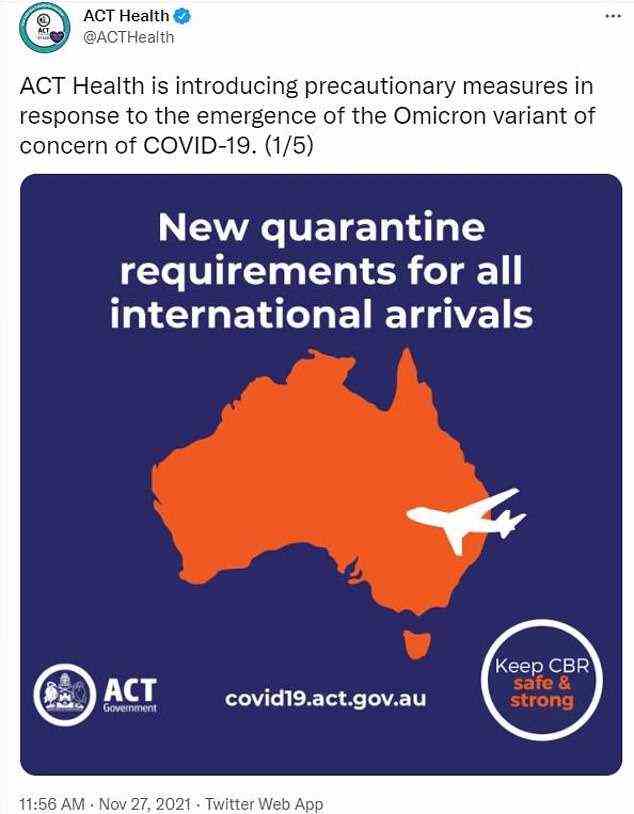
Those arriving from overseas into the ACT will need to isolate until midnight next Tuesday
The ACT ended hotel quarantine for overseas arrivals on November 12.
The Victorian health department says the new rules will apply to unvaccinated children under 12 and unaccompanied minors, along with any household contacts of the returned traveller.
All airline cabin crew arriving from overseas into NSW will also have to isolate for 14 days or until their next departure.
These rules are slightly different in Victoria with vaccinated cabin crew to isolate for 14 days if they had been to one of the nine African countries of concern.
Western Australian Premier Mark McGowan earlier on Saturday evening shut his state’s borders to South Australia in a bid to lock out the mutant new strain.
The ruling means only double-vaccinated South Australians can enter WA, where they must immediately go into quarantine for 14 days.
The changing of border rules comes amid fears the newly-named Omicron ‘super-variant’ is already in Australia via a repatriation flight from South Africa.
There are 20 returned travellers quarantining in the Northern Territory who were repatriated from South Africa last week – one of whom has tested positive to Covid.
Chief Medical Officer Paul Kelly said authorities were also in the process of tracking down about 100 Australians who recently arrived from the blacklisted countries and will now need to go into quarantine for two weeks.
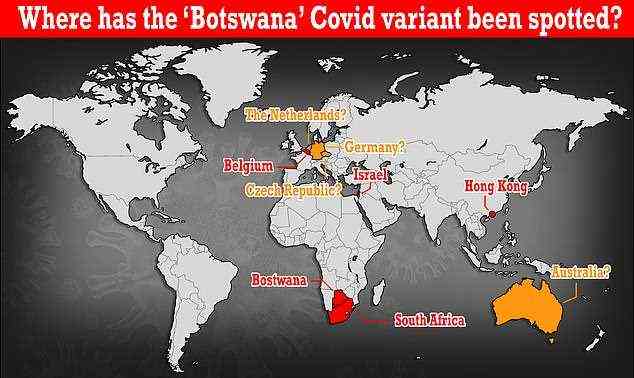
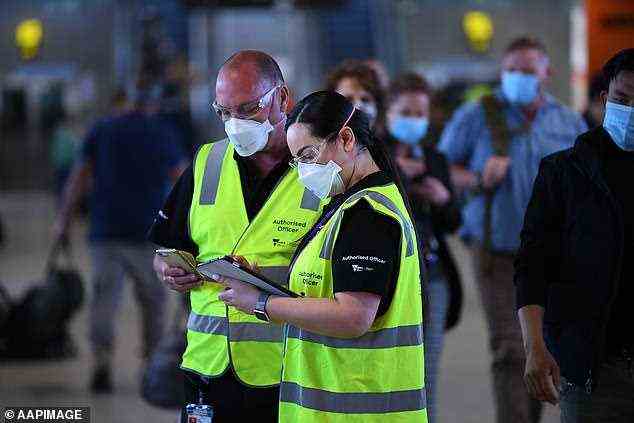
New quarantine measures have also been introduced for airline cabin crew (pictured are health workers at Melbourne’s Tullamarine Airport)
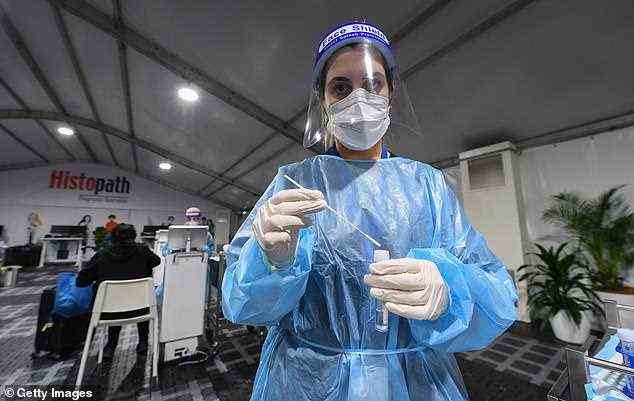
There are currently no known cases of the Omicron variant in Australia, Federal Health Minister Greg Hunt said (pictured nurse preparing Covid test for passenger)
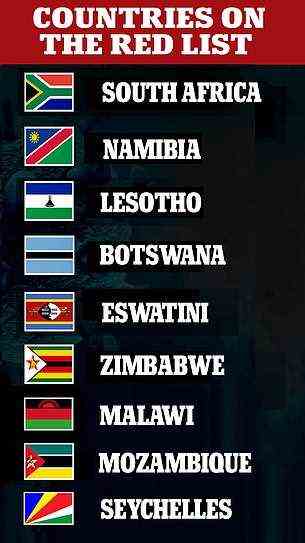
United States and Europe earlier placed six countries on the red list before Australia added another three – Malawi, Mozambique and Seychelles
The new rules include banning non-Australian travellers from the regions, enforcing supervised quarantine for returned passengers and suspending all flights from the nine countries for two weeks.
‘There are currently no known cases of the Omicron variant in Australia,’ Health Minister Greg Hunt said.
Professor Kelly warned it was too early to tell if Australia would be plunged back into lockdown if the virus made its way across the Indian Ocean.
‘In terms of ruling in or out, what else we might do, as the health minister has clearly said, we will do what we need to do,’ he said. ‘
‘At this stage, to move toward speculation about where we might end up in Australia, even if it came here and we don’t have it here yet, that is premature.’
He said there was too little information about the current variant to make any long-term decisions.
The UK confirmed its first two official Omicron infections on Saturday, with Germany and the Czech Republic also reporting suspected cases.
Germany’s initial sequencing suggests a traveler from South Africa was carrying the virus with several mutations shared by Omicron.
Officials are awaiting full sequencing later on Saturday local time.
Belgium has also revealed its first Omicron case – named by the World Health Organisation on Friday night – prompting EU chiefs to call for an ’emergency brake’ on all travel from southern Africa after it was also found in Israel.

The Belgian health ministry said a case of the new B.1.1.529 strain was confirmed in an unvaccinated young woman who had returned from Egypt 11 days ago, suggesting it is already being seeded across the continent and is widespread in Africa.
It came as the WHO designated it a ‘variant of concern’, its highest category.
Experts said there is early evidence to suggest Omicron has an ‘increased risk of reinfection’ and its rapid spread in South Africa suggests it has a ‘growth advantage’.
However, Angelique Coetzee, the chairwoman of the South African Medical Association, said that it was too early to begin imposing travel restrictions.
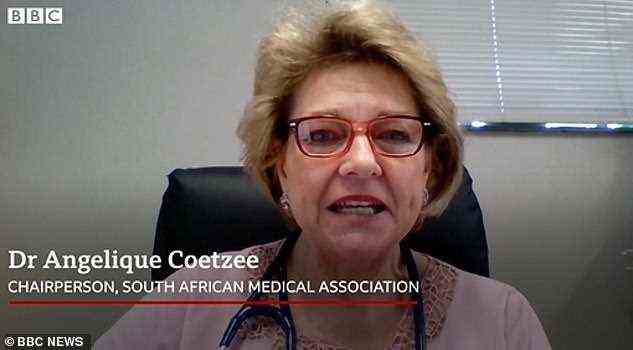
Angelique Coetzee, the chairwoman of the South African Medical Association, said that it was too early to begin imposing travel restrictions
‘It’s a hasty decision,’ she said.
‘I would understand if it was two weeks later and we knew much more about this viral infection that is going around, this mutation.
‘But for now, it is a storm in a tea cup, we have only become aware of this viral mutation … in the last week. So far what we have seen are very mild cases, so I’m not sure why we are all up in arms.’

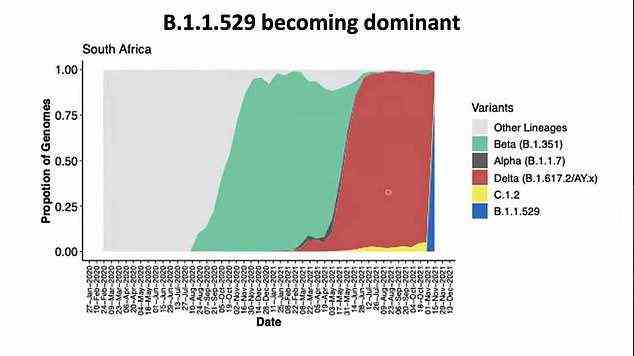
This chart shows the proportion of cases that were the B.1.1.529 variant (blue) and Indian ‘Delta’ variant (red) over time in Guateng province in South Africa, where the virus is most prevalent. It suggests that the mutant strain could outcompete Delta in the province within weeks
European Commission president Ursula von der Leyen had earlier called for an EU-wide travel ban to southern Africa warning that the Omicron strain could be world-dominant in months.
Meanwhile, US President Joe Biden will restrict travel from South Africa and seven other countries starting on Monday, following the detection of the new variant.
On Friday, Australian Prime Minister Scott Morrison said the Omicron strain was not a ‘variant of concern’.
‘But that can change,’ Mr Morrison said.
‘And we monitor all of these variants and we note the responses that are made by other countries and we consider those in real time.’
Mr Hunt assured the borders to South Africa would remain open.
‘If the medical advice is that we need to change, we won’t hesitate,’ he said on Friday.


He argued the new strain did not appear to lower the effectiveness of the Covid-19 vaccine.
‘It’s highly unlikely to affect the efficacies of the vaccine,’ he said.
‘This is a very different situation to the Delta emergence and the high case numbers we saw in India. We are very highly vaccinated.
‘There is no basis for change.’

